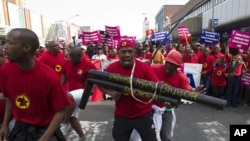Fuel shortages have begun to bite in South Africa two weeks into the annual so-called “strike season” as at least 250 gas stations have run out of supplies. Strikes are under way in two major sectors, and more are threatened.
Just four days into the strike by chemical and petroleum workers, Johannesburg and Pretoria are the worst hit by fuel shortages resulting in panic buying of gasoline in some areas and motorists making use of social networking sites on the Internet to keep up-to-date on where to fill up their vehicles.
70,000 workers in these sectors are out on strike and while unions have indicated some progress has been made with employers in the chemical industries, talks in the fuel sector are only expected to get under way in the next several days.
There are concerns that if the strike continues into next week the impact of potential fuel shortages on Africa’s largest economy will be severe across the spectrum - from the mining sector to hospitals and clinics.
The Chemical, Energy, Paper, Printing, Wood and Allied Products Union is demanding wage increases of between 11 and 13 percent while employers have offered seven percent. The current inflation rate is 4.6 percent.
The strike by 170,000 workers in the steel and engineering sector is already into its second week, and has severely disrupted the manufacturing sector. Unions have asked for a 13 percent increase. This strike has also been marred by violence, and 20 employer groups obtained a temporary court order which prohibits workers from coming within 60 meters of employer’s premises.
Gerhard Papenfus, CEO of the National Employer's Association of South Africa, tells VOA the employers sought legal redress because of widespread violence and failure by police in some cases to act against those perpetrating violence.
“We have the situation in some case, that the police are reluctant to enforce these orders and a letter has been written to the commissioner of police and even to the minister of police telling him that they have got to do their job,” said Papenfus.
The police have not responded to the allegations but Labor Minister Mildred Oliphant said Thursday that violence by strikers undermines the system of collective bargaining and weakens the unions engaged in negotiations. Oliphant said the engineering sector is critical to the economy of South Africa and she urged unions to use mediation channels available to them.
Union spokesmen have scoffed at allegations they are responsible for the violence, blaming it instead on agents seeking to undermine their legitimate demands.
Meanwhile the employers in the coal, gold and platinum sectors are bracing for strikes with the National Union of Mineworkers demanding 14 percent pay increases for these workers. Municipal workers are also threatening to stop working.
The Reserve Bank has warned that double digit wage demands in the current economic climate threaten South Africa’s long-term economic prospects due to the danger of inflation.
Fuel Shortages Mark Start of South African 'Strike Season'






